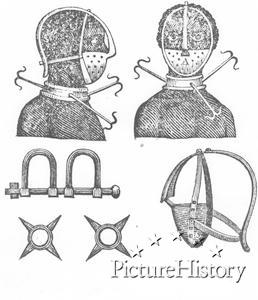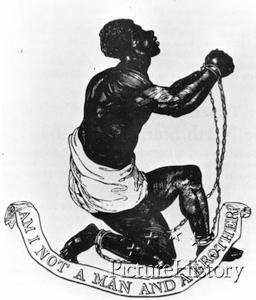 American Slavery "Setting the record straight"
American Slavery "Setting the record straight"Interestingly, the fact that the Founding Fathers neither justified slavery nor desired it to remain in America was even confirmed in a speech by congressional Democrat Alexander Stephens (1812-1883) of Georgia, the slave-holding Vice-President of the Confederate States of America.
In an 1862 speech entitled African Slaver: the Corner Stone of the Southern Confederacy, Stephens explained that the Founding Fathers, even those from the South, did not intend for slavery to remain a part of the nation. According to Stephens:
“The prevailing ideas entertained by him [Thomas Jefferson] and most of the leading statesmen at the time of the formation of the old Constitution were that the enslavement of the African was in violation of the laws of nature, that it was wrong in principle, socially, morally, and politically.
It was an evil they know not well how to deal with; but the general opinion of the men of that day was that, somehow, or other, in the order of Providence, the institution would be evanescent [temporary] and pass away. . . . Those ideas, however, were fundamentally wrong. They rested upon the assumption of the equality of races. { Personal note: The Declaration of Independence comes to mind here} This was an error, and the idea of a government built upon it; when the “storm came and the wind blew, it fell.” Our new government [the Confederate States of America] is founded upon exactly the opposite idea; its foundation is laid, its cornerstone rest, upon the great truth that the Negro is not equal to the white man. That slavery, subordination to the superior race, is his natural and moral condition. This, our new government is the first in the history of the world based upon this great physical, philosophical, and moral truth.”

Hence, the justification of slavery was a doctrine neither introduced nor promulgated by the Founders, a fact acknowledged by subsequent pro-slavery leaders such as Stephens, . . .
Even though the issue of slavery is often raised as a discrediting charge against the Founding Fathers, as noted above by Confederate Vice-President Alexander Stephens, the Founding Fathers had no intention of allowing slavery to remain a permanent fixture in the United States.
Slavery was not the product of, nor was it an evil introduced by the Founding Fathers; it had been introduced into America nearly two centuries before the Founders. As President of Congress Henry Laurens explained:
“I abhor slavery, I was born in a country where slavery had been established by British Kings and Parliaments, as well as by the laws of the country, ages before my existence . . . . The day, I hope, is approaching when, from principles of gratitude as well as justice, every man will strive to be foremost in showing his readiness to comply with the Golden Rule ‘Do unto others as you would have them do unto you.’”
Many of the Founders openly complained about the fact that Great Britain had forcefully imposed the evil of slavery upon the Colonies.
For example, Thomas Jefferson complained:
“He [King George III] has waged cruel war against human nature itself, violating its most sacred rights of life and liberty in the persons of a distant people who never offended him, captivating and carrying them into slavery in another hemisphere or to incur miserable death in their transportation thither . . . . Determined to keep open a market where men should be bought and sold, he has prostituted his negative for suppressing every legislative attempt to prohibit or to restrain this execrable commerce” [that is, he has opposed efforts to prohibit the slave trade].
The Revolution, the opportunity for America to create a new nation with new policies was a turning point in the national attitude against slavery. Although a few Founding Founders supported slavery, the clear majority of them opposed it, and many of them who had owned slaves as British citizens released them in the years following America’s separation from Great Britain (e.g., George Washington, John Dickinson, Caesar Rodney, William Livingston, George Wythe, John Randolph, and others). Furthermore, many of the Founders had never owned a slave. As John Adams thundered, “My opinion against it has always been known . . . Never in my life did I own a slave.”

Notice a few additional examples of the strong anti-slavery sentiment held by great numbers of the Founders:
“Christianity, by introducing into Europe the truest principles of humanity, universal benevolence, and brotherly love, had happily abolished civil slavery. Let us who profess the same religion practice its precepts . . . By agreeing to this duty.” - Richard Henry Lee, President of Congress, Signer of the Declaration
“I hope we shall at last and if it so please God, I hope it may be during my lifetime, see this cursed thing [slavery] taken out. . . . For my part, whether in a public station or a private capacity, I shall always be prompt to contribute my assistance towards effecting so desirable an event.” -William Livingston, Signer of the Constitution, Governor of New Jersey.
“Slavery, or absolute and unlimited power in the master over the life and fortune of the slave, is unauthorized by the common law. . . . The reasons which we sometimes see assigned for the origin and the continuance of slavery appear when examined to the bottom, to be built upon a false foundation. In the enjoyment of their persons and their property, the common law protects all.” - James Wilson, Signer of the Constitution, US Supreme Court Justice.
“As much as I value a union of all the States, I would not admit the Southern States into the Union unless they agree to the discontinuance of this disgraceful trade.” - George Mason. “Father of the Bill of Right”
"Why keep alive the question of slavery? It is admitted by all to be a great evil.” - Charles Carrol. Signer of the Declaration, A Framer of the Bill of Rights.
"Domestic slavery is repugnant to the principles of Christianity. . . . It is rebellion against the authority of a common Father. It is a practical denial of the extent and efficacy of the death of a common Savior. It is a usurpation of the prerogative of the great Sovereign of the universe who has solemnly claimed an exclusive property in the souls of men.” - Benjamin Rush. Signer of the Declaration.
 For
many of the Founders, their feelings against slavery went beyond words.
For example, in 1774, Benjamin Franklin and Benjamin Rush founded
America’s first anti-slavery society, and John Jay was president of a
similar society in New York.
For
many of the Founders, their feelings against slavery went beyond words.
For example, in 1774, Benjamin Franklin and Benjamin Rush founded
America’s first anti-slavery society, and John Jay was president of a
similar society in New York.In fact, many prominent Founding Fathers were members of societies of ending slavery, including William Livingston, Richard Bassett, James Madison, James Monroe, Bushrod Washington, Charles Carroll, William Few, John Marshall, Richard Stockton, Zephaniah Swift, and many others.
As John Quincy Adams noted, the Founders saw that “slavery . . . was destined to be banished from the earth.” Although the end of slavery did not occur in the Founders’ lifetime (or for nearly a century afterward), it was not because they lacked the desire; they simply were ahead of the rest of the nation, and this was especially true with the Founding Fathers from the South (e.g., George Mason, George Washington, James Madison, etc.) who were far ahead of most citizens in their own States on this issue.
 John
C. Calhoun once invoked George Washington as an authority to justify
slavery in a Senate speech on March 4th, 1850, declaring of Washington: “He was one of us, a slaveholder and a planter.”
John Adams, of course, points to the side of Washington ignored by
Calhoun: Washington’s anti-slavery side, a side little discussed today
but nonetheless very significant.
John
C. Calhoun once invoked George Washington as an authority to justify
slavery in a Senate speech on March 4th, 1850, declaring of Washington: “He was one of us, a slaveholder and a planter.”
John Adams, of course, points to the side of Washington ignored by
Calhoun: Washington’s anti-slavery side, a side little discussed today
but nonetheless very significant.Washington like the other founders of this nation had been born into a world in which slavery was accepted; he himself had become a slave owner at the tender age of 11 when his father died, leaving him slaves as an inheritance. As other family members died, Washington inherited even more slaves. Although he had grown up from his earliest youth as a slave owner, he worked to overthrow the very system in which he had been raised.
For example, as a member of the Virginia Assembly, he announced:
“I can only say that there is not a man living who wishes more sincerely than I do to see a plan adopted for the abolition of it [slavery]; but there is only one proper and effectual mode by which it can be accomplished, and that is by legislative authority; and this as far as my suffrage [vote and support] will go, shall never be wanting [lacking]."
Washington even chaired legislative committees that called for an end to slavery, but his own State never agree to his proposals. He therefore lamented:
“I wish from my soul that the legislature of this State could see the policy of a gradual abolition of slavery.”
Washington had committed himself to seeking a legal remedy by which slaves might be freed in his State and he also did so on the national level. In fact, the first federal law limiting slavery in America (passed on August 7, 1789) carried the approving signature of President George Washington. It was because of this law that Ohio, Indiana, Illinois, Michigan, Minnesota, Wisconsin, etc., prohibited slavery. (This policy unfortunately was changed by Congress in 1820 to allow the expansion of slavery.)
Although Washington had been unable to end slavery in his own State of Virginia, he circumvented State law by emancipating his slaves upon his death. Regrettably, State laws were then stiffened to close this loophole so that it became virtually impossible for anyone to emancipate his slaves, even at death.
This anti-slavery character of George Washington, especially the fact that he freed his own slaves, caused John Quincy Adams to be mystified when Southerners such as Calhoun pointed to Washington as a justification for owning slaves.
Personal note: It appears that the Founders really believed, “We hold these truths to be self-evident, that all men are created equal, that they are endowed by their Creator with certain unalienable Rights, that among these are Life, Liberty and the pursuit of Happiness. — That to secure these rights, Governments are instituted among Men, deriving their just powers from the consent of the governed, — That whenever any Form of Government becomes destructive of these ends, it is the Right of the People to alter or to abolish it, and to institute new Government, laying its foundation on such principles and organizing its powers in such form, as to them shall seem most likely to affect their Safety and Happiness. . . .” They then formed a Constitution to achieve these ends, how long will it take us to live up to their standards? To the extent we can, freedom will expand.
May God bless each of you,
David & Julie
Information and Quotes excerpted from “Celebrate Liberty!” footnotes by David Barton of WallBuilters, P.O. Box 397, Aledo, Texas 76008. 817-441-6044. www.wallbuilder.com

No comments:
Post a Comment